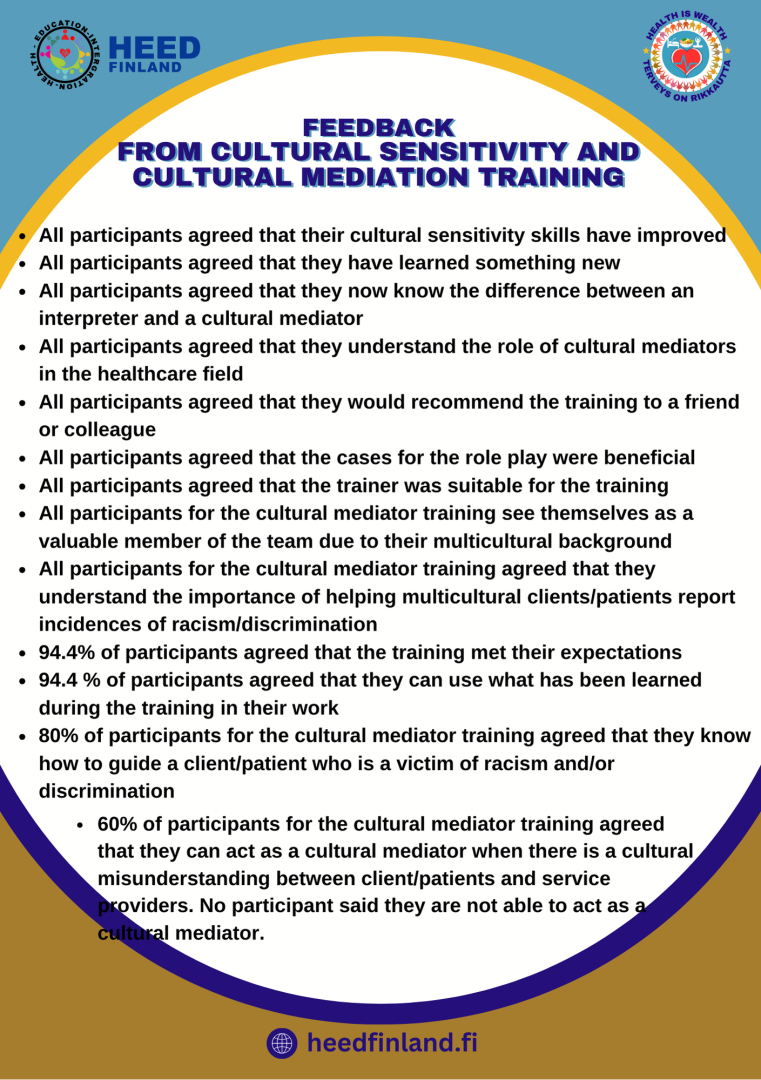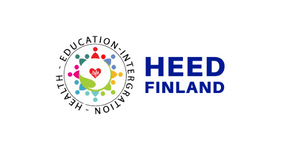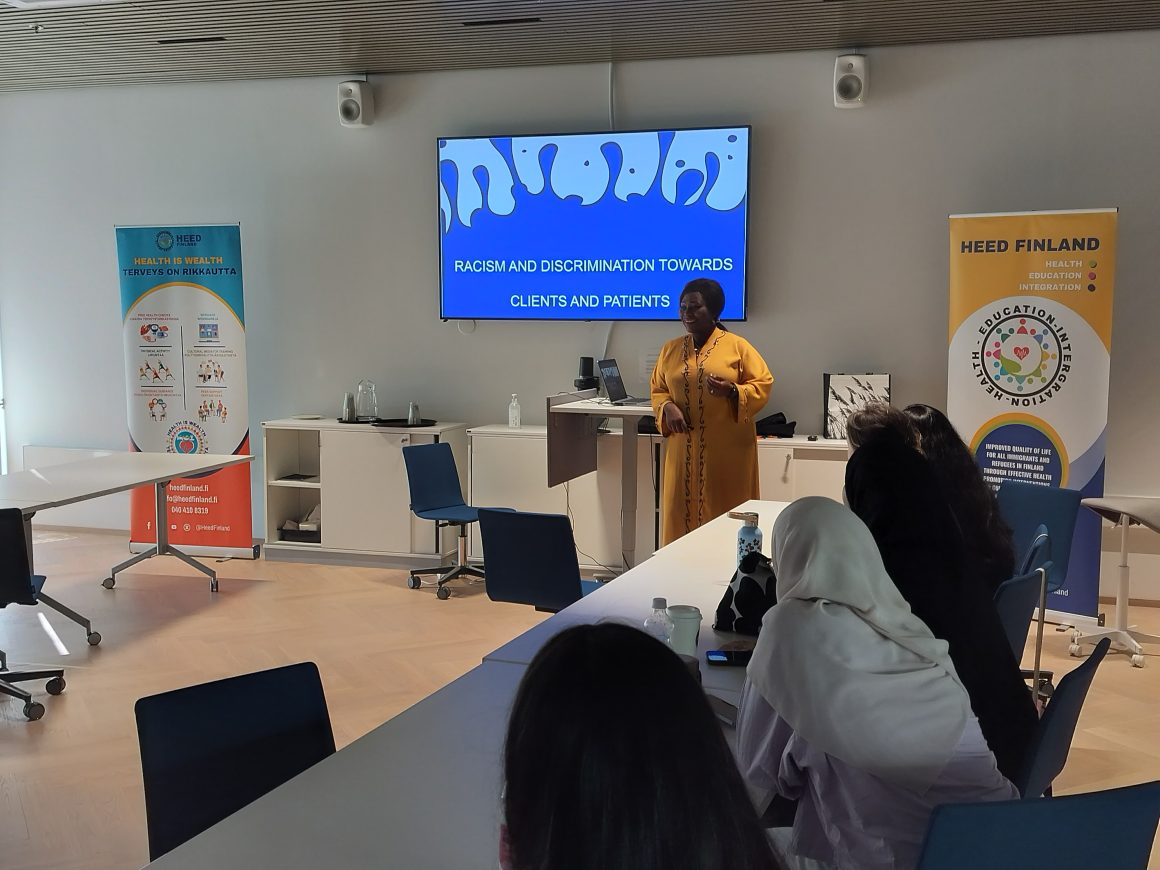Cultural sensitivity and mediation training is a supplementary training for professionals working in the social and healthcare field and organizations. The training aims to enhance participants’ skills in cultural sensitivity and to develop their ability to recognize the significance of their own assumptions, values, and attitudes in multicultural patient/client care. Participants will also improve their intercultural communication skills and understand the importance of intercultural dialogue in a multicultural patient/client interaction. This training equips participants with an immigrant background the tools to utilize their multicultural backgrounds and skills in their work, advocate for multicultural patients/clients against racism and discrimination, and act as cultural mediators in the workplace. Professionals who complete the training receive a certificate of participation and can serve as experts in multicultural work within their community. The cultural mediation training, first piloted by HEED Finland in 2020, has been developed over the years to address the growing diversity of patients/clients and staff members. This training is also a key objective of the Health is Wealth project, which aims to enhance cultural sensitivity in various areas of nursing.
The facilitator for the training courses, Emma Tamankag, is a senior nurse lecturer in the Department of Nursing at Laurea University of Applied Sciences and a project expert in the Health is wealth – Terveys on rikkautta project. She has also received training as a mediator at the International Mediation Campus (IMC). With nearly 20 years of experience as a registered nurse in various nursing environments, Emma has observed numerous conflicts within healthcare teams and between patients and healthcare providers which could have been prevented through cultural sensitivity and mediation training. Given Finland’s rapidly changing demographics, cultural sensitivity training is crucial for professionals in the social and healthcare fields. Having cultural mediators readily available in various units is a vital step toward preventing or de-escalating conflicts arising from cultural misunderstandings between patients/clients and healthcare or service providers. This would greatly improve patient safety and compliance and ensure that the rights of patients/clients with immigrant backgrounds are respected.
In the spring of 2024, a total of 46 participants attended the training, divided into two separate groups. Among them, 26 were nursing students from diverse cultural backgrounds enrolled in the nursing degree program at Laurea University of Applied Sciences. The remaining 20 participants were healthcare professionals from various HUS Helsinki University Hospital units, including ten native Finns and ten nurses with immigrant backgrounds. The two-day training provided to healthcare professionals from HUS began with cultural sensitivity training for all participants on the first day, followed by cultural mediation training and role-playing on the second day, specifically for professionals with immigrant backgrounds.
The training content covered various topics, including racism and discrimination towards clients or patients. This equipped healthcare and service providers with the skills to assist multicultural clients in filing complaints if they are victims of such discrimination. By exploring the complexity of culture and cultural values, participants were able to identify their own biases, learn how to be culturally sensitive, and recognize the importance of effective communication in preventing culture-based conflicts. Additionally, the training addressed the role of cultural mediators in the social and healthcare fields, emphasizing their role in resolving or preventing misunderstandings between healthcare or service providers and patients/clients. Practical exercises and simulation using real-life examples made the training more concrete, preparing participants to act as cultural mediators in their workplaces.

In the qualitative feedback, participants expressed high levels of satisfaction. One participant wrote, “Kuinka ihana koulutus oli! Hyvin suunniteltu ja ylitti omat odotukseni,” which translates to, “What a lovely training. It was well planned, and exceeded my expectations.” When asked about what the participants learned from the training, one participant wrote, “Uutta tietoa kulttuurisensitiivisyydestä sekä, miten huomioda eri kultturitaustoista tulevia potilaita yksilöllisesti,” meaning, “New information about cultural sensitivity, and how to consider patients from different cultural backgrounds individually.” Another participant mentioned, “Erilaisten kulttuurien ajattelutapoja, kulttuurivälittäjän merkitystä terveydenhuollon palveluissa. Hyviä vinkkejä arkeen ja työhön,” which translates to, “Ways of thinking of different cultures, the importance of a cultural mediator in healthcare services. Good tips for everyday life and work.”
When asked what could be improved in the future, participants suggested having two training days for all participants, allowing more time for simulation exercises, and providing regular training for a larger portion of the staff. This feedback tells us about the increasing need for professionals with the expertise in cultural mediation and cultural sensitivity in patient/client work The highlights of the training, according to participants, included the general discussions, real-life examples, simulation exercises, and the simulation game on cross cultural communication. One participant also remarked, “Alun peli oli tosi kiva ja rikkoi jäätä. Ihana Emma, jolla on karismaa vetää tällaista settiä,” meaning, meaning “The game at the beginning was really nice and broke the ice. Lovely Emma, who has the charisma to pull off such a set.”
Emma Tamankag
The writer is a Cultural Sensitivity and Cultural Mediation Trainer and the Project Expert for the HEED Finland Health is Wealth project.



